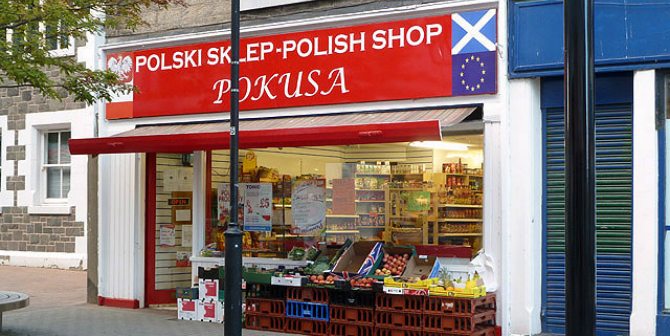 The upcoming referendum presents a golden opportunity to fully engage with the socio-economic pros and cons of the EU and the inevitable debate on what it means to be British, and European. Jasmina Bidé argues, however, that while this discussion holds the potential to be informative, invigorating and influential, previous experience and the current track of the Leave campaign indicates that this is not the tone that the rest of the campaign period will take. Rather, the EU referendum is yet another unfortunate opportunity for xenophobic, anti-Eastern European racism to rear its head.
The upcoming referendum presents a golden opportunity to fully engage with the socio-economic pros and cons of the EU and the inevitable debate on what it means to be British, and European. Jasmina Bidé argues, however, that while this discussion holds the potential to be informative, invigorating and influential, previous experience and the current track of the Leave campaign indicates that this is not the tone that the rest of the campaign period will take. Rather, the EU referendum is yet another unfortunate opportunity for xenophobic, anti-Eastern European racism to rear its head.
In the past couple of years, this rhetoric has seen no shortage of opportunities to project itself into, and centre itself within, the public discourse on the European Union and Britain’s place in it. With the 2014 EU parliamentary election it not only took centre stage but demonstrated its political currency, with the avowedly anti-EU— and it must be said, anti-Eastern European— UKIP party’s dominance at the polls. While this was explained away as the result of a disaffected yet minuscule organised minority, the angry and derisory rhetoric centring around Central-Eastern European migrants left an indelible print on the flavour of political and contemporary discussion. This served to normalise and render somewhat acceptable the scapegoating of this migrant population on a mass scale. Last year’s election was no different in tone.
In directly focussing on Britain’s position in the EU and by extension Europe, the coming referendum presents the most coherent opportunity for anti-Eastern European sentiment, couched in ‘intellectual’ discussion, to re-enter political and thus mainstream discourse. To be clear: I am making no judgement on the possibility of a Brexit at all; every citizen should have the ability to democratically express themselves, whatever their position on the matter. Rather, I take issue that the expansive arena provided by the referendum legitimises the dissemination of xenophobic racism towards Central Europeans under the guise of acceptable political discussion and debate.
Every vote which encourages the development of campaigns which ostensibly pit the “Us”, or the “in-group” against a clearly defined “out-group” is not only dangerous but helps to normalise this discourse. This is currently the case around the immigration debate concerning Central-Eastern Europeans, and the upcoming referendum provides as ripe an opportunity as ever to exploit a xenophobic sentiment. And it is anti-Eastern European, rather than anti-European in general. Of course, Polish migrants form the biggest foreign-born European population in the UK, making them a clear target.
However, the language used to denigrate Central-Eastern European migrants is decidedly different to that used to describe other migrants, and most likely stems from their perceived position in British society. Indeed, it is unlikely to hear about how the French are taking our homes and our benefits, or how the Germans undercut our wages. It was not the Italians and Greek who were barred from entering the UK for a period of time after ascending to the EU, but the Romanians and Bulgarians. The language used to address these groups, presents them not only as dispensable, but more worryingly, a problem to be solved with a Leave vote the solution.

It is not simply the language of “immigration” which is insidious, but also the cunning with which the argument is deployed. In these debates it is disheartening to note the pitting of one immigrant or ‘out’ group against the other, which is a discernible tactic employed by some Brexit campaigns. In suggesting that the UK is not averse to all immigration, just specific types, the Leave campaign is indirectly targeting Central-Eastern European migrants, seen as the least skilled and most vulnerable migrants who add little to the economy. The suggestion that the UK would welcome skilled, non-European migrants if they had the ‘choice’ of controlled migration is in direct contravention to the UK Government’s decision to cut post-study work visas, the easiest and least costly methods of retaining relatively small numbers of highly skilled, non-European migrants. However, in pushing this discourse, those who oppose ‘uncontrolled’ migration are able to present themselves as not racist, just concerned about economics. These tactics of hiding behind one immigrant group to legitimately attack another are not new and will not end with the UK leaving the EU. Thus, these claims should not be accepted as legitimate arguments, but rather recognised for what they are: xenophobic racism, utilised to advance the interests of those who wish to see a certain political outcome.
It is important that whatever our position on the referendum, we recognise that Central-Eastern Europeans are still being, as they traditionally have been, unfairly targeted as scapegoats on which to advance a political outcome. It is our responsibility to collectively call out the all too often instances in which this when this occurs, and resoundingly reject this, whether in everyday discussion with our peers or in the media. Indeed, the issue of xenophobic racism in light of the referendum was recently discussed amongst LSE students as part of a larger project initiated by a third year Romanian student. Central-Eastern European students were interviewed for a short documentary, and all students were invited to attend an event which set forward the issue of xenophobic racism. While often recognising the privilege their socio-economic background conferred them, those interviewed expressed concern about the rising levels of anti-Eastern European rhetoric, while highlighting that the victims of anti-immigrant rhetoric were constantly changing, depending on what was the most politically expedient. If it was not the Poles, one interviewee opined, it was the Bulgarians and Romanians. When this did not hold as much political currency, it was the muslims, or other non-white groups, another interviewee remarked.
With the advent of the referendum, there can be no doubt that the discussion has swung right around, with Central-Eastern Europeans again at the centre of the debate. As the 23rd of June approaches, the fear mongering will only increase — it is not far fetched to predict that anti-immigrant (read: Central-Eastern European) rhetoric will be whipped to fever pitch where it is thought necessary to turn out a vote. However, it is imperative that all campaigners for the upcoming referendum be sufficiently confident in presenting the benefits and drawbacks of EU membership without resorting to thinly-veiled racism, or condoning its dissemination in any form. If not, the true substance of their vision should be thoroughly questioned. There are many issues to discuss concerning Britain’s future. Xenophobic racism should not be used to detract from these.
This post represents the views of the author and not those of the BrexitVote blog, nor the LSE. Image Copyright Walter Baxter and licensed for reuse under this Creative Commons Licence.
Jasmina Bidé is the LSESU Anti-Racism Officer and a third year BSc Government Undergraduate student from Swaziland. As Anti-Racism Officer, she has concentrated on diversifying the curriculum and addressing the attainment gap between white and non-white students. Jasmina is also an associate editor at the LSE Undergraduate Political Review.







Quite to the contrary I think the EU referendum debate has been framed almost in terms of the economic impact of Brexit on UK jobs and growth, with barely a mention of immigration from Eastern Europe. This commentary might of been accurate if it was about 2014 European elections but now seems off target.